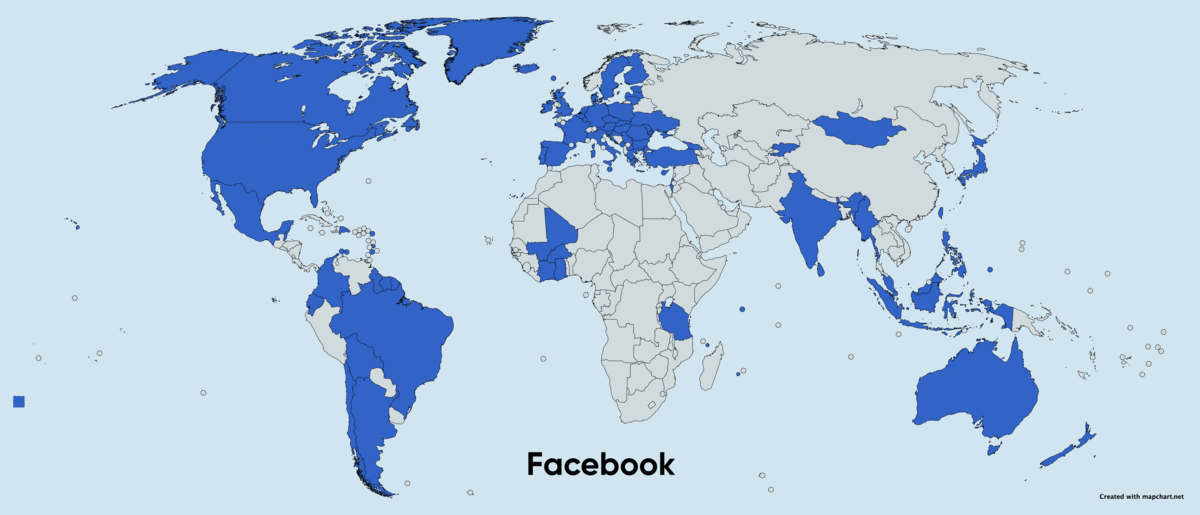
This map shows the countries in which Facebook and Google have implemented heightened transparency standards for political ads.
In its new report, PI looks into the implementation of transparency tools by Facebook, Google and Twitter in relation to political advertising. This work was produced in collaboration with partner organisations InternetLab and ELSAM.

This map shows the countries in which Facebook and Google have implemented heightened transparency standards for political ads.
Over the past years, there has been much attention paid to political advertising transparency on online platforms. Growing internet penetration and the rising popularity of social media have made social media platforms a key battlefield for political actors in the fight for votes, where political ads have proved themselves to be a popular weapon. This means online transparency towards voters has become more imperative than ever.
And yet, social media platforms’ regulation of political ads remains fragmented. Each platform operates fluctuating and often widely differing transparency standards for different countries. These differences operate at multiple levels. For a start, each platform defines political content and ads differently, with Google going as far as operating a country-specific definition of electoral ads. In Facebook’s case, there is also the regulation of “social issues” - issues that are not directly related to political campaigning but are still politically sensitive (e.g. immigration). Social issues vary from one country to the next, with little clarity as to the criteria applied by Facebook. Unless an ad is regulated as “political” or a “social issue”, next to no information is provided to users as to the spend, reach, targeted audience and advertiser of a specific ad. In many countries, this regulation doesn’t take place, leaving both individual users and civil society in the dark.
The combined effect of these inconsistent policies is to create a two-tiered system within each platform, with a wide regulatory gap separating the transparency haves and have-nots. We highlighted these problems in 2019. While some progress has been made since, we are saddened to observe the transparency divide persists. And as our research shows, it has consequences for democracy.
PI commissioned in-depth studies on political ads transparency in two if the world’s largest democracies: Brazil and Indonesia. Our partners InternetLab and ELSAM looked into Facebook, Google and Twitter’s definitions of political and social issue ads, how these platforms were deploying transparency tools for political advertising in these countries (if at all), the adverse impacts of non-existent or limited transparency, and what could be done to improve the standards.
We then carried out a comparative analysis of the electoral regulatory framework and online platform policy development in these two countries. To inform our research, we relied on publicly available information regarding the full range of transparency tools that the platforms make available to different countries, company policies, and reporting. We also asked Facebook and Google for clarification and have included wherever relevant their responses.
Below is a brief summary of our research findings.
The US election was a clear illustration of the transparency divide between haves and have-nots, as well as its ramifications. Google applied no less than two “sensitive event” policies resulting in temporary bans of political ads, and Facebook carried out at least five significant changes covering voter and census participation suppression, additional transparency checks for candidate spend, increased verification requirements for branded content, and user controls to see fewer political ads. In Facebook’s case, some of these changes were part of a specific - and seemingly globally unique - plan to “protect the US election”. The extent of these changes and the speed with which they were implemented is, to PI’s knowledge, unrivalled in any other country.
Facebook makes its transparency tools available globally. In some countries, such as the US and the EU, these tools are compulsory for advertisers to use. In others, they remain optional. With little incentive to comply with these optional tools, advertisers don’t use them.
PI could not find any publicly available information detailing the internal processes by which social media platforms decide to regulate political ads in any given country. The difference in treatment can be stark. In Peru’s 2020 congressional elections, political advertisers on Facebook were allowed to freely targets ads to users located in Peru without checks. However, the same advertisers were prevented from targeting ads to US-based users on account of having failed to comply with the mandatory transparency tools enforced in the US.
Across Facebook and Google, the regulation of political ads necessarily results in those ads being automatically recorded in ad repositories (Facebook’s Ad Library, Google’s Transparency Report), with detailed information about the ad. However, in the absence of regulation, ads seeking to exploit controversial political issues can fall through the cracks. This in turn makes it harder, if not impossible, for civil society to monitor any potential harms on democracy.
Though lesser known as political campaigning arenas, the use of political ads in WhatsApp and Instagram has significantly increased. It is possible for Instagram ads to be included in the Ad Library - but only if they are shown in countries which benefit from political ads regulations.
Based on our findings above, we articulate the following recommendations:
This research is a part of PI’s work on Defending Democracy and Dissent, which aims to investigate the role technology plays in facilitating and/or hindering everyone’s participation in civic society.